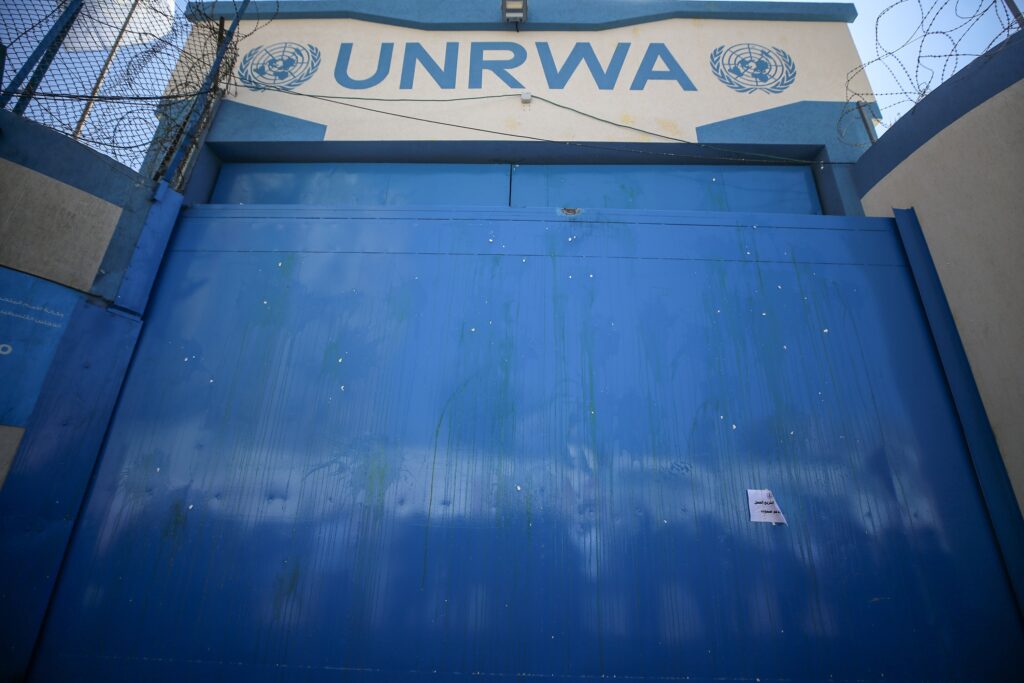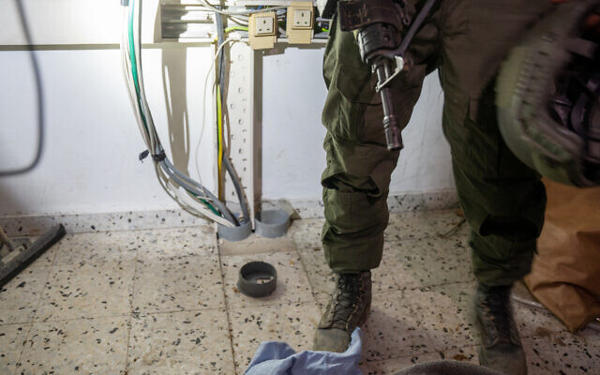Australia/Israel Review
Truth and Untruths about UNRWA
Nov 20, 2024 | AIJAC staff

Israel’s anti-UNRWA legislation
Commentary about the new Israeli legislation ‘banning UNRWA’, passed by the Knesset on October 28, has mischaracterised the scope of the laws, falsely advanced the idea that UNRWA is irreplaceable and underplayed Israeli concerns about UNRWA. This factsheet provides some corrective information.
Scope of the laws
The legislation does not ban UNRWA from Gaza or the West Bank. Instead, it bans UNRWA from operating inside Israel, including all of Jerusalem. The legislation also prevents Israeli authorities from cooperating with UNRWA in the West Bank and Gaza.
The legislation will take effect 90 days after it was passed. Israel has declared it will use that time to ensure that aid continues to flow into Gaza by consolidating collaborative supply lines with other agencies.
Following the passage of the legislation, Israeli Prime Minister Binyamin Netanyahu released a statement, pledging:
Since avoiding a humanitarian crisis is also essential, sustained humanitarian aid must remain available in Gaza now and in the future. In the 90 days before this legislation takes effect – and after – we stand ready to work with our international partners to ensure Israel continues to facilitate humanitarian aid to civilians in Gaza in a way that does not threaten Israel’s security.
Irreplaceable UNRWA?
The many media and political claims that only UNRWA can provide aid to Gaza are not accurate. There are multiple aid agencies operating in Gaza. These include a number of other UN agencies, such as the UN World Food Program. In fact, according to figures from COGAT (Coordinator of Government Activities in the Territories), the IDF division responsible for overseeing aid, only 13% of all aid to Gaza between August and October was distributed by UNRWA. In contrast, 50% of that aid was distributed by the World Food Program.
While these are IDF figures, it is notable that when then Israeli Foreign Minister Israel Katz pointed out on Nov. 4 that UNRWA was only distributing 13% of Gaza aid, UNRWA and the UN did not dispute his figures, merely arguing that “the Israeli figures do not account for the key role [UNRWA] plays in coordinating aid deliveries” and “Without UNRWA coordination… no UN agency could operate at the scale required.”
Yet this claim for indispensability in coordinating aid by others is not very credible. Other aid agencies successfully operate in crises throughout the world without “coordination” by anything resembling UNRWA. For example, the UN’s Central Emergency Relief Fund (CERF) asserts that it has, since its creation in 2005, “provided more than $6 billion in life-saving assistance in more than 100 countries and territories,” with more than US$800 million in 2019 alone. The idea that only UNRWA can do in Gaza what CERF does everywhere else appears absurd.
Why is Israel concerned about UNRWA?
Multiple media reports have asserted that the reason for this new Israeli legislation is the involvement of some UNRWA employees in the October 7 Hamas-led invasion of Israel. Israel is concerned about this, but this is not the root cause of the new legislation. There is considerable, incontrovertible evidence of seemingly uncontested Hamas abuse of UNRWA facilities over the last 13 months of war. Further, UNRWA has long proved an important obstacle to the achievement of Israeli-Palestinian peace over many years.
The current war
Here are some examples of Hamas coopting UNRWA over the past 13 months, and/or UNRWA silence in the face of Hamas abuse of UNRWA facilities:
Hamas combatants / UNRWA employees
Fateh Sherif Abu el-Amin was Hamas’ leader in Lebanon, responsible for all of Hamas’ operations in the country, including coordinating terror activities with Hezbollah, procuring weapons and recruiting operatives. He was also the principal of an UNRWA secondary school and the head of the UNRWA Teachers’ Union in Lebanon. UNRWA was told that el-Amin was a Hamas official but merely suspended him temporarily. He was killed by Israel in September 2024.
Muhammad Abu Attawi was a Hamas ‘Nukhba Force’ commander who participated in the October 7 invasion, leading a squad that massacred some 16 Israelis hiding in a bus shelter after fleeing the Nova music festival, and kidnapped four others. He was also an UNRWA employee. Israel had provided his name, along with 100 others, to the UN in July 2024, but no action was taken. He was killed by Israel in October 2024.
In October 2024, Hamas leader Yahya Sinwar was killed by Israeli forces. His bodyguard carried a passport identifying him as an UNRWA employee. These are far from the only UNRWA employees killed as Hamas combatants in this war.
In August, UNRWA Director-General Philippe Lazzarini was confronted in Switzerland by Ayelet Samerano, whose son was killed on October 7. She pointed out that video available online shows that, “On October 7, an UNRWA employee entered Israel and actively participated in the massacre, brutally murdering and kidnapping my boy’s body, with a United Nations car, into Gaza.”
Participation in the October 7 invasion and before
Numerous UNRWA employees participated in the October 7 invasion and massacres. Early in the war, Israel provided the UN with a list of 12 UNRWA employees who took part in the invasion. UNRWA subsequently fired nine of them. This is frequently reported in the media. However, Israel later provided UNRWA with a list of 100 UNRWA employees who allegedly took part in the invasion; UNRWA has taken no action against them, saying Israel has not provided enough evidence.
United Nations spokesperson Stephane Dujarric admitted on Sept. 30 that UNRWA has no ability to properly vet its staffers for terror ties.
This lax attitude means UNRWA terror links long predate the current war.
For example, between 2000 and 2004, 13 UNRWA employees were arrested over involvement with terrorist organisations. This includes Nahed Attalah, director of food supplies for UNRWA in Gaza. He admitted to using his UN vehicle and free travel permit to transport arms, explosives and combatants to carry out terrorist attacks. He also admitted to using his UN travel pass to meet with terrorists abroad to transfer money into Gaza for terrorist activities.

Electrical cables found by the IDF that lead directly from UNRWA’s main Gaza headquarters into an underground Hamas data centre located beneath it (Image: IDF)
Abuse of UNRWA facilities
A sophisticated Hamas data centre (with server, industrial battery power banks and living quarters) was located by Israeli forces directly under UNRWA’s Gaza headquarters. Electrical cables went from the UNRWA building above, through the floor, into the Hamas tunnel.
Israel has found numerous other examples of Hamas storing its materiel in or under UNRWA facilities, equipment or packaging. A 167-page lawsuit filed in a New York court in June 2024 details how UNRWA allowed Hamas to use its facilities for weapons storage, allowed tunnels and command centres to be built under UNRWA facilities, used Hamas-approved textbooks in schools and provided Hamas with revenue by paying UNRWA employees in US dollars. (This forced those employees to convert their salary into shekels – the currency used in Gaza – in Hamas-controlled currency exchanges, allowing Hamas to earn a ten to 25% commission for each trade.)
In recent months, as Hamas tunnels have been located and destroyed by Israel, Hamas fighters and commanders are increasingly using UNRWA and other schools – now used to house displaced Gazans – as command centres (thereby rendering these schools ‘military objects’ under international law, subject to attack by Israel). UNRWA always condemns the subsequent Israeli attacks against the Hamas combatants in these sites but refuses to acknowledge or condemn the Hamas use of UNRWA facilities that leads to such attacks.
One Israeli hostage, 84-year-old Ditza Heiman, released in the November 2023 ceasefire deal, was held in the home of an UNRWA school teacher.
Thousands of UNRWA school teachers and other UNRWA employees celebrated the October 7 Hamas invasion and massacre of Israelis.
Long-term concerns
Since its establishment, UNRWA has helped prevent Israeli-Palestinian peace in numerous ways.
Foundational reasons
UNRWA classifies a ‘Palestine refugee’ as someone displaced from their home in Mandatory Palestine as a result of the 1947-1949 war, as well as all their descendants. According to UNRWA, they do not lose “refugee” status even if granted full citizenship in another country. This inalienable, hereditary refugee status is different from all non-Palestinian refugee populations across the world, which is why the Palestinian “refugee” population today is far larger than it was when UNRWA was established in 1949.
The UN High Commission for Refugees (UNHCR) provides immediate aid to all non-Palestinian refugee populations, but also assistance to resettle them in safe third countries. In contrast, UNRWA provides incentives for “Palestine refugees” to remain dependent on UNRWA aid, and never assists them to permanently resettle outside its camps. Additionally, UNRWA keeps alive – and unofficially endorses – the promise of a “return” to Israel for all descendants of the original refugees. These twin policies disincentivise people to end their hopeless refugee existence.
Anti-peace practices
Beyond the foundational reasons why UNRWA helps perpetuate the conflict, its practices do the same. UNRWA schools teach antisemitic and anti-peace education, and its teachers glorify violence against Israelis. This practice has been repeatedly condemned by the EU Parliament, but international contributions to UNRWA, including by Australia, continue, despite a lack of reform.
UNRWA refugee camps in West Bank, Gaza and Lebanon have armed Palestinian terrorist organisations openly operating in them. UNRWA does not condemn this nor insist that these be removed if UNRWA operations are to continue. The UN doesn’t consider Hamas a terrorist organisation. As such, UN bodies – including UNRWA – cooperate with Hamas, despite the fact that UNRWA’s chief backers (which include the US, UK and Australia) proscribe Hamas as a terrorist organisation, and have legislation that bans any cooperation with terrorist organisations. This might explain why, in 2004, the former head of UNRWA told the Canadian Broadcasting Corporation, “I am sure that there are Hamas members on the UNRWA payroll, and I don’t see that as a crime.” More recently, in February this year, Martin Griffiths, the UN’s Under-Secretary General for Humanitarian Affairs, insisted “Hamas is not a terrorist group for us… It’s a political movement.”
In February 2024, Israel released information showing that some 12% of Gazan UNRWA employees were affiliated with Hamas or Islamic Jihad, and nearly half have immediate family who are members.
On those few past occasions where UNRWA officials have attempted to stand up to Hamas, they are successfully intimidated into silence, including through expulsion of the employee or employees who raised the alarm.
Tags: Gaza, Hamas, Israel, Palestinians, UNRWA






